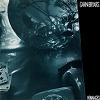Gavin Bryars, "Hommages"
 Reissued with bonus tracks and detailed sleeve notes, this album highlights the period where Bryars moves from his previous style involving the synthesis of non-musical sources, loops and an almost standard (but beautiful) orchestral arrangement. Here he composes for small ensembles and includes piano and vibraphone almost anywhere he can. This is a very different Bryars to the one I am familiar with, very different but still utterly captivating.
Reissued with bonus tracks and detailed sleeve notes, this album highlights the period where Bryars moves from his previous style involving the synthesis of non-musical sources, loops and an almost standard (but beautiful) orchestral arrangement. Here he composes for small ensembles and includes piano and vibraphone almost anywhere he can. This is a very different Bryars to the one I am familiar with, very different but still utterly captivating.
Many of the pieces show a far more playful side to Bryars. As someone who is more accustomed to his most famous pieces, I was surprised to hear music that did not shatter my heart when I listened to them. The completely percussion-led “The English Mail-Coach” is a world away from the crushing emotional weight I expect from Gavin, the jaunty melodies providing a lift when a expected a downer. The repetitive streak that runs through his work is still present, each piece tends to evolve from a small set of ideas and he just shifts the focus of the music as he goes.
Conceptually, this is still the very same Gavin Bryars. The almost compulsive attention to detail that is evident from his constant working, re-working and re-re-working of his mighty “The Sinking of the Titanic” is present on many of these pieces. References to the author Raymond Roussel appear in the notes several times in his sleeve notes, as all these pieces are from the same period it is easy to envisage Bryars trying to tie Roussel to his own work as much as he could, like a child who has given up on collecting toy cars and learning everything about them moving on to the next obsession.
As nice as it all sounds, I cannot help but feel that these recordings have not aged very well; pieces like “My First Homage” and “Hi-Tremolo” sound of their time. That being said, these six pieces are each delightful little (and not so little) vignettes that are almost like short plays, the subtle changes in emphasis mirroring character developments on a stage. This dramatic flair transcends the individual pieces and its influence can be felt in the work of those who have followed Bryars. Aspects of his music, in particular the midnight jazz meets Satie atmospheres present throughout Hommages, have been co-opted by many other composers and musicians. Echoes of these pieces can be heard in the works of Angelo Badalamenti (particularly the end credits from the Twin Peaks TV series) and in Nick Cave’s ballads from The Boatman’s Call era and onwards.
It is nice to see a side of an artist that is normally not on show and Hommages does just that. It may not be the jewel in the Bryars back catalogue or even a classic of modern composition but it is an enchanting album nonetheless.
samples:



